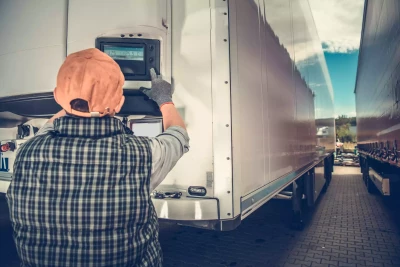When the Mercury Rises, Can Temperature Recorders be Trusted?
July 30, 2024
 Temperature management in the transport of perishable goods presents a recurring challenge each year as we progress through the sweltering summer months. As we’re reminded each summer, discrepancies between trailer temperature and recorder temperature can cause serious headaches across the entire supply chain. Let’s explore this persistent issue and the processes involved in ensuring the integrity of sensitive goods.
Temperature management in the transport of perishable goods presents a recurring challenge each year as we progress through the sweltering summer months. As we’re reminded each summer, discrepancies between trailer temperature and recorder temperature can cause serious headaches across the entire supply chain. Let’s explore this persistent issue and the processes involved in ensuring the integrity of sensitive goods.
Maintaining the correct temperature while transporting perishable goods is vital. The difference between the true temperature inside the trailer and the readings from the temperature recorder can lead to significant issues, including product spoilage and subsequent rejections. Understanding where breakdowns occur and identifying who is responsible for the product is essential to mitigate these issues.
“We communicate with all of our carriers that we definitely have to watch temperature more closely and let us know what’s happening from the shipping and receiving side,” says Triple T Transport Senior Sales Executive John Mahle.
Warmer weather, particularly in regions like the American south and southwest, increases the risk of temperature abuse. As temperatures rise, the potential for product spoilage escalates, making it imperative for carriers to monitor temperatures closely. This is an annual concern, with preparations often starting in April to tackle the challenges presented in hot climates.
Who is responsible for maintaining the correct temperature for shipments containing perishable goods? Get answers on this pressing topic in the latest episode of the Stay In Your Lane Podcast.
Consider a recent scenario involving a shipment picked up by one of Triple T’s carrier partners. The product, which was pre-cooled and stored in a warehouse for weeks, raised temperature concerns upon delivery. To reduce the risk, the refrigeration unit’s temperature was proactively reduced from 34°F to 32°F prior to loading of the goods. Despite these measures, temperature discrepancies were observed at the receiving end.
Upon examining the temperature recordings, it became clear that the trailer’s refrigeration unit operated flawlessly. The set point, discharge temperature, and return air temperature consistently aligned, except during normal defrost cycles. This consistency suggests that the trailer maintained the desired temperature throughout the transit.
 In contrast, the temperature recorder placed with the goods by the shipper presented a different story. The recorder showed temperatures spiking to 40°F and beyond, raising doubts about accuracy. It appeared the recorder might not have been started until arrival, which contradicts the trailer’s continuous temperature maintenance.
In contrast, the temperature recorder placed with the goods by the shipper presented a different story. The recorder showed temperatures spiking to 40°F and beyond, raising doubts about accuracy. It appeared the recorder might not have been started until arrival, which contradicts the trailer’s continuous temperature maintenance.
Several factors could contribute to these discrepancies. The recorder may have malfunctioned, leading to inaccurate readings. If the product was loaded warm, it would typically reflect in the initial temperature spikes. However, in this case, the product was pre-cooled for two weeks, making this less likely. Extended exposure to high temperatures at the receiving dock, coupled with potential warm air ingress, could have affected the product’s temperature during unloading.
“Our contention is that this was a bad recorder,” says Mahle. “Had the product been loaded warm, we would have seen the return air temp spike up within a couple of hours.”
Precautions should be taken to avoid similar issues. Start by verifying recorder functionality and ensure that temperature recorders are correctly started and functioning before transit. Next, carefully monitor conditions on the loading dock. Communicate with receiving facilities to ensure proper dock temperatures are maintained. Finally, equip drivers and handlers with the knowledge to identify and address potential temperature issues during loading and unloading.
Maintaining the integrity of refrigerated goods during summer months requires diligent monitoring and proactive measures. Understanding the potential pitfalls and implementing robust processes can help to ensure product safety and customer satisfaction. At Triple T Transport, we are committed to continuously improving our practices to navigate these seasonal challenges effectively while providing the highest level of service to our supply chain partners.














